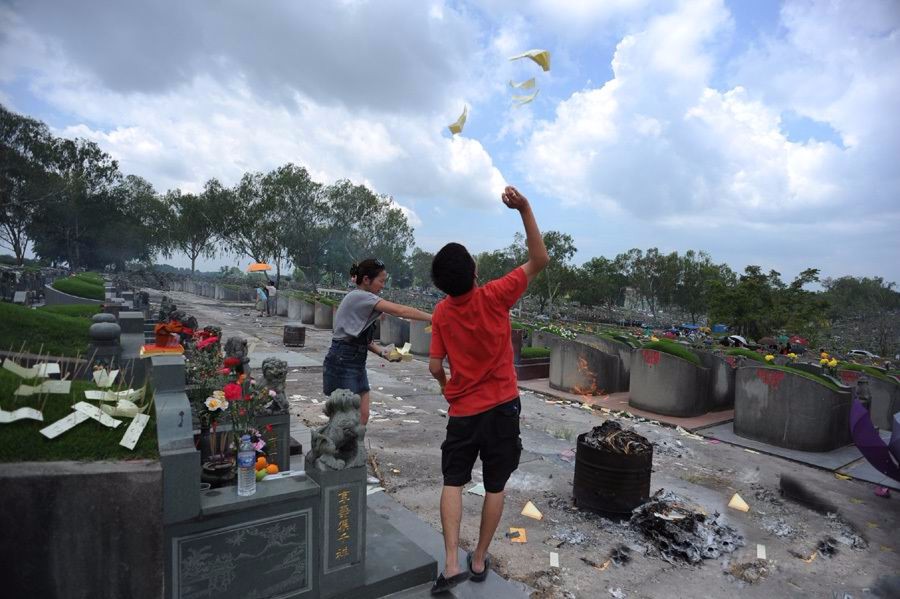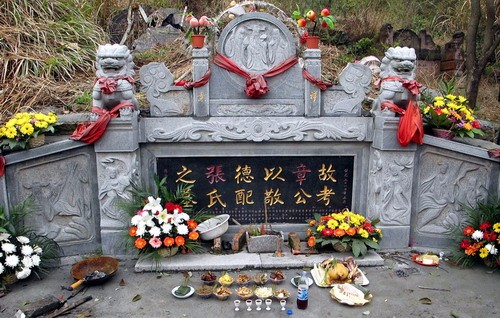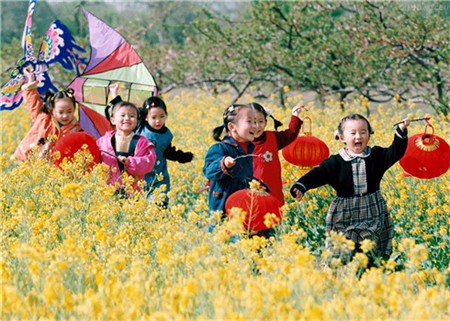Chinese Qingming Festival (Tomb-sweeping Day)
Introduction

As one of the twenty-four solar terms, it is an important seasonal symbol for agriculture. After the festival, the temperature begins to rise up and rainfall increases. So it marks a good time to plow and sow.
Qingming is also a time for the Chinese people to go outside to enjoy the greenery of Spring season.
Fast Facts about Qingming Festival
| Chinese Name: | 清明节 |
|---|---|
| Alternative Names: | Tomb-sweeping Day, Pure (or Clear) Brightness Festival, Taqing Festival (suburban outing) |
| Date: | April 4th or 5th (Chinese Solar Date) |
| Festival Type: | Traditional Chinese Festival |
| Countries/Areas to Celebrate: | China, Vietnam, South Korea, Ryukyu |
| Customs: | Tending Graves, Going for an Outing, Swing, Flying Kites, Planting Willows |
| Significance: | to remember the dead and the dearly departed |
Date and Holiday Durations
The Qingming Festival is usually held on April 4 or April 5. The Chinese people will have one day off to celebrate the festival. As it is usually combined with the neighboring weekend, people will have three days off for the holiday. The following chart shows the exact times for the festival in the following years and holiday durations:
Note: As many people will go out to travel during this three day holiday, traffic is extremely jammed and attractions are full of tourists. So, pay attention to travel during this period in China.
| Year | Date of Qingming Festival | Holiday Durations |
|---|---|---|
| 2023 | April 5 | April 5 |
| 2024 | April 4 | April 4 - 6 |
| 2025 | April 4 | April 4 - 6 |
| 2026 | April 4 | April 4 - 6 |
Origin
The Qingming Festival was originated from the Spring and Autumn Period (770-476 BC) to commemorate a loyal official called Jie Zitui. He saved his emperor by cutting a piece of meat from his own leg during his exile time. After the emperor returned to the country 19 years later, he forgot Jie Zitui. Reminding by other officials, the emperor realized his mistake and tried to find Jie. However, Jie lived in seclusion with his mother in the mountain. The emperor set fire to the mountain to smoke Jie out under the suggestion of some officials. At last, Jie and his mother were dead under a willow tree. The regret emperor ordered the day that Jie died to be Hanshi (Cold Food) Festival to commemorate him. On that day, no fire was allowed and only cold food can be eaten. The second year after Jie died, the emperor went to the mountain to sacrifice him and found the dead willow where Jie died besides revived. So, he gave the willow the name of ‘Qingming Willow’ and set the day after Hanshi Festival to be Qingming Festival. Gradually, the two festivals combined into the present Qingming Festival.
Important Customs
The most important custom for Qingming Festival is to offer sacrifice to the ancestors and the dead family members. People will go to the cemeteries to sweep tombs and offer sacrifices. Food and flowers are usually offered to the dead. Also they will burn sme paper money hoping the dead can live with enough food and clothes in the other world.
Another important custom is to travel outside during the Qingming Festival. As the weather is good during these days, it is a very good time for the people to take a walk in the countryside.
Other activities for the festival include flying kites, planting willow trees and playing on the swing.



Another important custom is to travel outside during the Qingming Festival. As the weather is good during these days, it is a very good time for the people to take a walk in the countryside.
Other activities for the festival include flying kites, planting willow trees and playing on the swing.



Famous Tang Poem - Qing Ming (清明) by Du Mu
清明时节雨纷纷,
qīng míng shíjiéyǔ fēn fēn
A drizzling rain falls like tears on the Qing Ming Festival,
路上行人欲断魂。
lù shàng xíng rén yù duàn hún
The mourner’s heart is breaking on his way.
借问酒家何处有?
jiè wèn jiǔ jiā héchù yǒu
Where can a winehouse be found to drown his sadness?
牧童遥指杏花村。
mù tóng yáo zhǐ xìng huā cūn
A cowherd points to Almond Flower (Xing Hua) Village in the distance.
More Traditional Chinese Festivals:
Chinese Spring Festival Laba Festival Lantern Festival Dragon Heads-raising Day Ghost Festival Mid-Autumn Festival Double Seventh Festival Dragon Boat Festival The Double Ninth Festival Winter Solstice
Chinese Calendar
| Su | Mo | Tu | We | Th | Fr | Sa |
|---|---|---|---|---|---|---|
| 31廿二/22 | 1廿三/23 | 2廿四/24 | 3廿五/25 | 4廿六/26 | 5廿七/27 | 6廿八/28 |
| 7廿九/29 | 8三十/30 | 三月 (Mar) 9初壹/1 | 10初二/2 | 11初三/3 | 12初四/4 | 13初五/5 |
| 14初六/6 | 15初七/7 | 16初八/8 | 17初九/9 | 18初十/10 | 19十壹/11 | 20十二/12 |
| 21十三/13 | 22十四/14 | 23十五/15 | 24十六/16 | 25十七/17 | 26十八/18 | 27十九/19 |
| 28二十/20 | 29廿壹/21 | 30廿二/22 | 1廿三/23 | 2廿四/24 | 3廿五/25 | 4廿六/26 |
{{week}}. {{month}} {{day}}, {{year}}
Lunar Date
{{lmonth}} {{lday}}, {{syear}} ({{zodiac}}) Year ({{lyear}}){{sday}} Day, {{smonth}} Month
Clash {{clash}} | Evil {{evil}}
Auspicious
-
{{#luckly}}
- {{.}} {{/luckly}}
Inauspicious
-
{{#unluckly}}
- {{.}} {{/unluckly}}
Auspicious Times
-
{{#luckyTime}}
- {{.}} {{/luckyTime}}
